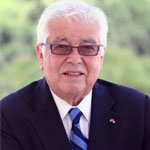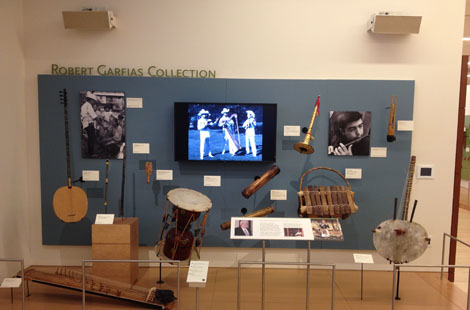UCI anthropologist’s instrument collection on display at Musical Instrument Museum

UCI anthropologist’s instrument collection on display at Musical Instrument Museum
- October 23, 2013
- Collection includes 125 instruments from a half dozen countries
-----
 A kayagum from Korea. A tanbur from Turkey. Tube zithers from the Philippines. These
are a few of the 125 instruments currently on display at the Musical Instrument Museum
in Phoenix, courtesy of UCI’s Robert Garfias, anthropology professor and world renowned
ethnomusicologist.
A kayagum from Korea. A tanbur from Turkey. Tube zithers from the Philippines. These
are a few of the 125 instruments currently on display at the Musical Instrument Museum
in Phoenix, courtesy of UCI’s Robert Garfias, anthropology professor and world renowned
ethnomusicologist.
Earlier this year, he contributed his entire collection of musical instruments to the museum, along with access to photographs and more than 64,000 feet of ethnographic film he has collected over his 51-year academic career.
“I have done field work in many, many place and my collection comes from all over the world,” he says.
His field research sites include more than a dozen areas of the world, including Japan, Korea, Okinawa, the Philippines, Mexico, Romania, Turkey, Mozambique, Guatemala, Honduras, Belize, Burma, Costa Rica, Nicaragua and Zimbabwe, where he mastered the languages of many of these places. His vast collection of documentary films and sound recordings (both field and studio recordings of visiting artists and others who visited the Seattle area) can be found in the University of Washington Ethnomusicology Archives, where his is also credited with establishing the ethnomusicology program. In 1986, he was appointed by then President Ronald Reagan to the National Council on the Arts. For ten years, he served as an advisor to Presidents Reagan, George H.W. Bush and Bill Clinton while advising policy for the National Endowment for the Arts. Also credited to his name are former positions as past president of the Society for Ethnomusicology, vice provost of the University of Washington, and dean of the School of Arts at UC Irvine.
In 2005, Garfias was presented with the Order of the Rising Sun, Gold Rays with Neck Ribbon distinction, Japan’s highest government honor bestowed upon a non-Japanese citizen. The honor recognized his contributions to promoting traditional Japanese culture and cultural exchanges between Japan and the United States. In 2012, he was given honorary membership to the Society for Ethnomusicology in recognition of his service to the society and field.
He notes that as he’s nearing the end of his career, donating his collection was a natural choice.
“I am closer to the exit than to the entrance at this point in my life,” he says. “The Musical Instrument Museum is a good place to leave my collection where I know it will be taken care of.”
A celebration and reception are being held at the museum Friday, November 1, 2013 at 2:00 p.m. in his honor. For further information, please contact Michelle Rauman, 480.478.6026 or michelle.rauman@MIM.org.
-Heather Ashbach, Social Sciences Communications
-----
Would you like to get more involved with the social sciences? Email us at communications@socsci.uci.edu to connect.
Share on:
Related News Items
- Careet RightNotes from a future professor
- Careet RightCan Opportunity Zones ever meet their poverty-fighting promise?
- Careet RightFei Yuan named one of ten global China Times Young Scholar Fellows
- Careet Right'Wired for Words: The Neural Architecture of Language,' an excerpt
- Careet RightEveryone's looking for a partner who has these 3 traits, according to research


